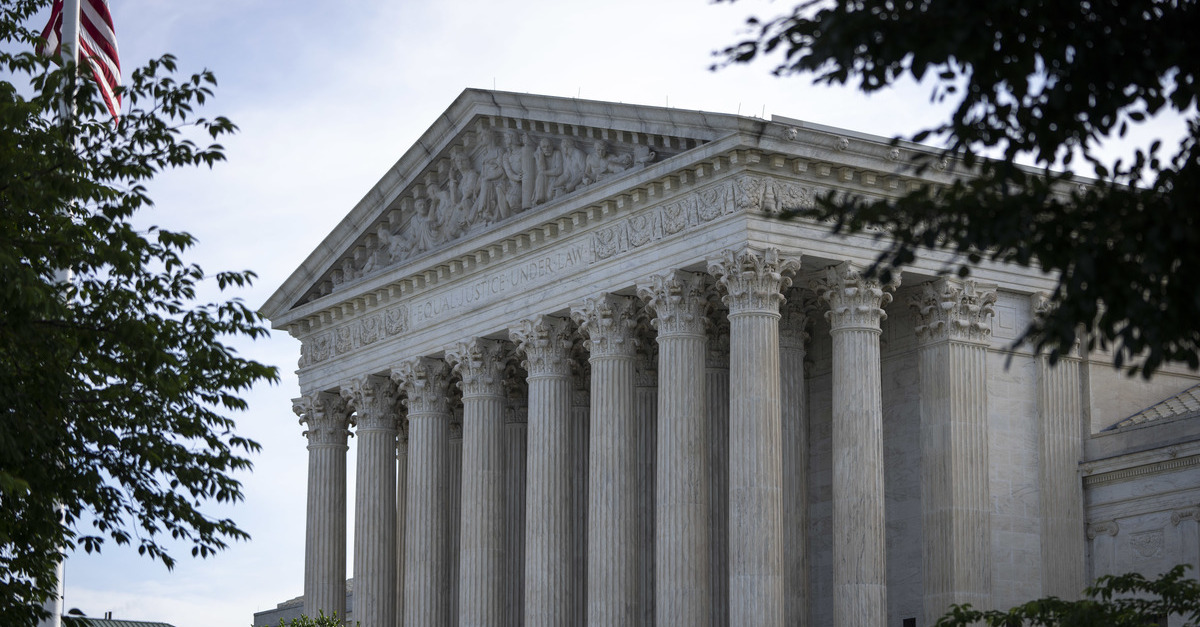
The Supreme Court has denied certiorari sought by a conservative organization that sought to essentially undo a Massachusetts law that bans secretly recording people in most situations.
Project Veritas, James O’Keefe’s conservative activist group known for publishing undercover videos of media organizations, sued Suffolk County District Attorney Rachael Rollins (D) over a Massachusetts prohibition against secret recordings except in cases where police conducted recording while on the job in public spaces.
According to Project Veritas’ certiorari request, it had plans for four investigations it says “have been censored” by the Massachusetts recording law:
PVA alleged it wants to investigate landlords taking advantage of housing shortages in Boston where college students may live in unsafe and dilapidated conditions. It wants to investigate government officials’ stances on immigration policy and deportation. It alleged it would record interactions with government officials in Boston and around the State House to investigate this issue. PVA alleged its desire to record interactions between members of Antifa organizations and public officials. [citations removed]
On Monday, the Supreme Court simply denied the certiorari request without any explanation.
The group claimed the law was overbroad. A federal district court partially dismissed Project Veritas’ claims in March 2017, but said the Massachusetts law was unconstitutional to the extent it prohibited secret audio recordings of government officials, including law enforcement officers, “performing their duties in public spaces.”
On appeal, the U.S. Court of Appeals for the First Circuit found that the Massachusetts law was not overbroad, and that Project Veritas’ complaint was not ripe.
In its certiorari brief, Project Veritas described the law this way: “In short, any oral communications that PVA journalists would secretly record except for those of police are felonies.”
Project Veritas said the law amounted to “unequivocal censorship of its most effective means of newsgathering.”
The group also pointed to an Illinois Supreme Court ruling that said a law similar to the one in Massachusetts was overbroad, and that the First Amendment protects secret recording of private people in certain situations.
Rollins, in her brief opposing certiorari, called Project Veritas’ claims of a split in authority “illusory,” saying that the Illinois statute banned all nonconsensual recording, while the Massachusetts law prohibited only “surreptitious nonconsensual recording.”
The First Circuit affirmed a lower court ruling dismissing Project Veritas’ First Amendment claim for overbreadth, and for failing to state a claim on which relief could be granted. It also vacated the district court’s order dismissing Project Veritas’ claim with prejudice for ripeness, “insofar as that statute bars the secret, nonconsensual audio recording of government officials discharging their duties in public.”
Notably, four conservative groups filed amicus briefs in support of Project Veritas’ certiorari request. The Thomas More Society, CatholicVote, Accuracy in Media, and Protect the 1st all supported Project Veritas’ claims.
No amicus briefs were filed in support of Rollins.
The First District remanded to the lower court with instructions to dismiss Project Veritas’ claims without prejudice.
“The 1st Circuit got it right with its carefully considered December 2020 decision, which protects an individual’s right to record police in the course of their work, while also ensuring the rights of private individuals who approach public employees for help,” Rollins said in a statement emailed to Law&Crime. “Today’s announcement that Supreme Court will not disturb that decision provides all of the parties involved, as well as members of the community with a clear understanding of the path forward.”
Project Veritas expressed dismay at the Supreme Court’s denial of its petition.
“We are disappointed the Supreme Court decided not to hear this matter,” Project Veritas Attorney Benjamin Barr said in a statement. “Project Veritas believes that citizens have a right to understand what their government does when the public isn’t watching. This Massachusetts law criminalizes a critical investigative tool, and in the process, injures the First Amendment rights of all Americans.”
[Editor’s note: this story has been updated with comment from Rollins’ office and Project Veritas.]
[Image via Drew Angerer/Getty Images]
Have a tip we should know? [email protected]